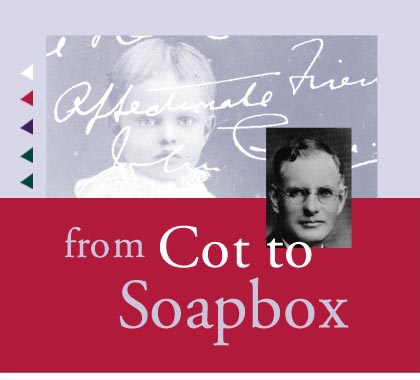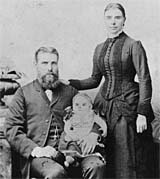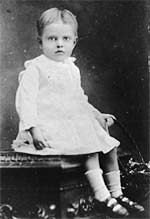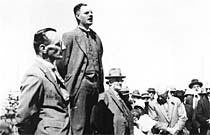
|
John Curtin was born in Creswick, a Victorian mining town, on 8 January, 1885. It was the year Australians went to war for the first time-fighting for Britain in the Sudan; the first woman was admitted as a medical student to the University of Sydney; and the Australian Workers Union was founded. The Curtin family lived in a weatherboard cottage overlooking Creswick Creek. John was the oldest child of a family of four-brother George and sisters Mary (Mollie) and Frances (Francie). His
parents-John and Kate Curtin-were Irish and John's mother was a
strong woman, vocal, dominant and wrapped up in politics; it was
she who encouraged young "Jack" to develop an interest in
politics. The family set about
managing a succession of hotels. The constant moving from town to
town meant that John had an erratic education before leaving school
at 14 to help support the family through what John recalled as
times of "bread without butter." His first job was as a copyboy for
the Age, earning five shillings a week. As a teenager, John went with his father to meetings during the Commonwealth federation campaigns-listening to the debates on whether or not Australia should take this first step on the road to separation from Britain. The birth of the Commonwealth in 1901 profoundly influenced his feelings about being an Australian and his beliefs about the future of this new nation. Continuing to question established opinion and questing for more knowledge led John to the Yarra Bank and into discussions with socialists such as Frank Anstey and Tom Mann, whose radical ideas affected his own ideals. It was about this time that he abandoned Catholicism and embraced Socialism. "All hail! Christ the Socialist!" he wrote several years later. "We need more of the Christianity of Christ worked out according to the best possible political and economic forms of society. We must create the machinery that will make practically applicable the brotherhood of man in the widest relations possible... This true relation of men to one another on the basis of brotherhood without class privilege is the principle which Socialism strives for." He won a reputation as a "Labor boy-orator" speaking, not from prepared notes but as the spirit of truth moved him-atop soap boxes from Hyde Park to the Domain, from street corners to the Yarra Bank. The response from the crowds was exciting, inspiring and hazardous-hecklers did not confine themselves to verbal abuse-but John Curtin was a convincing speaker able to manage the rowdiest crowd. It was good training for the political life ahead.
|
 |
|




